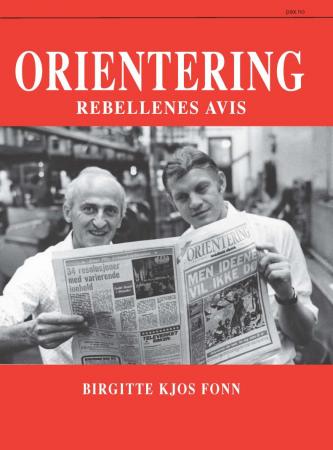G. K. Chesterton – The Innocence of Father Brown (1911)
I first met Father Brown in the 1954 movie, where Alec Guinness plays him so convincingly that it’s his voice I hear in my mind when I read these stories. I don’t mind that the murderer usually turn out to be The Protestant, The Atheist, or some other soul that has been lost to the Catholic Church. It’s the religious dimension that gives these stories their appeal, the impression they give that, although being suddenly beheaded by a criminal mastermind is no doubt evil and inconvenient, what we should really worry about is lesser, everyday sins like fanaticism, coldness, pride, and greed.
Recommended: Yes, although the movie is a more coherent introduction, and should be watched first, to prevent Father Brown from taking any other shape in your mind than Alec Guinness.

Birgitte Kjos Fonn – Orientering, rebellenes avis (2011)
In the histories of Norway’s 20th century leftists, I see paralells to today’s rightists. You’d be surprised at how many there are. The radical leftists and communists at the newspaper Orientering complained about the oppressive climate for independent thought in Norway in the 1950s with many of the same words that the right use to complain about political correctness today. In other words: The largest difference between Orientering and Document is about 50 years.
Recommended: Yes. The book is sympathetic to Orientering, as one would expect, but not uncritical of their East Bloc bias, and this is in any case a far more interesting book than Frank Rossaviks SV.

Well there was one more difference: The possibility to express un”authorised” views other than by obscure mimeographed leaflets, especially regarding foreign politics. There was one radio channel, where Social Democrat (Arbeiderpartiet) and mainstream “unsocialist” (read conservative or Høire) views were excluded. All newspapers were following some party line – mainly non-social democrat. Close to all of these were pro NATO.
They even included one “authorised” anti NATO (but otherwise loyal) voice – Karl Evang. Anyone more critical would only be “head” in mimeographed leaflets.
And, if you were a pacifist, you would be the target of Secret Police, and even the ordinary police would use the force of ten officers to control a demonstration consisting of five (or six if you include the two year old in a pram) pacifists.
The “oppression” of right wing racists (or Islam sceptics) today is far away from what happened when Orientering was started.
“one radio channel, where Social Democrat (Arbeiderpartiet) and mainstream “unsocialist” (read conservative or Høire)”
should of course read … one radio channel where anything _except_ …
A historical parallel doesn’t mean the situations are identical. It means they are similar enough so that looking at one of them through the lens of the other, improves our understanding of both.
For instance, Orientering (/SF) comes out intellectually inferior in the comparison, because they believed in so much Communist propaganda, and morally inferior, because they didn’t mind much of the authoritarianism that they did see. For instance, when the Berlin Wall was erected, they accepted its purpose at face value: An anti-fascist protection wall.
Drawing this parallel should offend today’s rightists more than the old leftists.
But it’s still an interesting and meaningful parallel. The book is full of descriptions of Orientering, or of how people at the time perceived Orientering, or how Orientering viewed themselves, that apply almost equally well to Document today.
And if you think it was more difficult to speak your mind freely then, you’re right, but look at the language you’re using yourself: “right wing racists”. There’s a cost of opposing the mainstream, today as well.
Re “right wing racists” – what would you call a number of participants in the discussions in for instance Norway’s most selling newspaper VG? The ones who say they are racists?
At what cost?
(But I agree in that I should have remembered to put “right” (as in the party Høyre) in quotes. I usually remember to do that. )
I compared Orientering specifically to Document. You replied with a comment about “right wing racists”. If it didn’t refer to them, I don’t see the relevance to this post.
The relevance, as I see it, is that today even extremists like those found in for instance the VG debates (or “debates”) don’t meet the restrictions that people associated with Orientering were subject to.
Do you think there is extensive Secret Police surveillance on prominent document contributors?
My point is, you seem to look at being scolded in media as equivalent to the police harassment many more or less left wingers experienced back when Orientering was at it’s high.
So when I say that there are interesting parallels between two things, your reply is that “no there can’t be, because here is one way in which they’re not identical”?
Like I said earlier, a historical parallel doesn’t mean the situations are identical. It means they are similar enough so that looking at one of them through the lens of the other, improves our understanding of both.
Of course, I can agree that if I lay down a matchstick along the highway it is parallel.